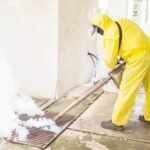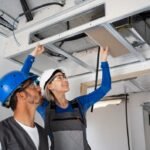Properly vented plumbing is an absolute necessity for your home’s drainage and sewer system to function correctly. Perhaps it was issues with slow drains, strange smells, or gurgling noises that alerted you to the fact there was improper venting. Venting in the realm of plumbing is not something every homeowner realizes, and yet it is probably one of the most important aspects involved in plumbing that can head off disaster right in the beginning. In the current manual, we will embark on the analysis of a vented plumbing system, as to why it is essential, what are the main principles and steam online every home needs to be run properly.
What is a Vented Plumbing System?
A vented plumbing system has been designed to maintain proper air circulation throughout the pipes. It helps the wastewater to flow smoothly through the drainage system. These vents are usually placed vertically on your roof and connected to them. They let air into the pipes. This process, in turn, assists in preventing the creation of vacuums, which can ruin the flow of water as well as stop the building blocks of sewer gases from entering your living quarters.
Key Functions of a Vented Plumbing System:
- Promotes Proper Drainage: Air vents help in blocking water from sticking inside the pipes, by getting rid of airlocks.
- Prevents Sewer Gas Backflow: If not correctly vented, dangerous gases may get into your house through your drains.
- Maintains Water Pressure: A properly vented system ensures that the water pressure is uniform, thus, preventing slow drains.
How Does a Plumbing Vent Work?
Plumbing vents are connected to your home’s drainpipes and usually exit through the roof. These vents serve two major functions: they allow sewer gases to escape, and they allow fresh air to enter the plumbing system. Fresh air is critical because it helps maintain neutral air pressure in your pipes, enabling water to flow freely and preventing backups.
Components of a Plumbing Vent System:
- Main Vent Stack: This is the central vent that leads to the roof, allowing gases to escape safely.
- Branch Vents: These connect the individual fixtures, like your toilet and kitchen sink, to the main vent stack.
- Air Admittance Valves (AAVs): In some modern systems, AAVs are used instead of roof vents. They allow air in but prevent gases from leaking back out.
The Consequences of Improper Venting
Improper venting is a common and serious problem in your house that can cause various issues, from minor annoyances to serious health risks. Below are some of the most familiar problems that will arise when your plumbing isn’t vented properly:
1. Slow Drains
Without correct venting, drains have problems with maintaining a steady flow. Water backending or slower than usual discharge are two possible things that might catch your eye.
2. Gurgling Noises
One of the more common symptoms of improper venting is the gurgling of the water as it goes down the sink. This is an indication of trapped air in the pipe trying to force its way out, which is often due to a broken or under-vented system.
3. Unpleasant Odors
The venting of your plumbing is the proper way to keep sewer gases from getting out the sewer line and, in fact, back into your house. As a result, you can be faced with quite foul odors that come from the drains. Furthermore, they’re unsafe to inhale.
4. Sewage Backup
In extreme cases, faulty venting can lead to sewage backup. Water pollution is possible in case the pressure in your pipes increases, which might lead to wastewater getting back into the sinks, toilets, and bathtubs.
Why Proper Venting is Essential for Health and Safety
A vented plumbing scheme isn’t only responsible for keeping things to flow smoothly—it helps to protect your health. Here’s why:
- Prevents Sewer Gas ExposureSewer gases such as methane and hydrogen sulfide are not only smelly but they are also hazardous. Exposure to these gases can result in headaches, dizziness, and respiratory problems. The right venting ensures that these gases exit your home safely.
- Avoids Pipe DamageIncorrectly vented systems creating pressure imbalances that can eventually lead to leaks, cracks, or even burst pipes in your pipes. Venting is the practice of balancing air pressure and keeping the plumbing system intact.
Compliance with Building CodesIn most places, installation of plumbing systems requires venting, a building code. Failing to meet the code can result in fines; however, more importantly, it could result in plumbing issues that ultimately threaten your home.
Types of Plumbing Vents
There are a number of unshielded plumbing vents, all of which serve a specific purpose. Varies with the design of a house and is connected to the number of fixtures, different vent types may be used.
1. Main Stack Vent
Commonly known like the vent, it is essential for every home. It is the line that is in the form of a vertical pipe that goes through the roof and it is the channel for the gas to escape as well as for the air to enter it.
2. Common Vent
The common vent usually connects two or more faucets that are situated near one another, thus, forming one of the following: toilet/sink, sink/sink, medicine cabinet/sink, kitchen sink/prep sink. There is also a mention that the traditional system was so complicated that one common vent was already ample.
3. Air Admittance Valve (AAV)
Consequently, AAVs are mechanical valves that are there to allow air into the plumbing system but also to prevent harmful gases from escaping. These are the valves that are typically utilized in houses that are not feasible for the installation of the conventional vent stack.
Signs That Your Plumbing System Isn’t Vented Properly
The subject at hand is spotting venting faults early, so they don’t grow into more serious issues. Here are a few signs that your plumbing system may not be vented correctly:
- Gurgling Drains: The presence of air being captured in your water pipes will be heard through the sink gurgling after flushing the toilet or emptying the sink.
- Foul Odors: Odor regularly coming out of your sinks are a warning that sewer gases may be getting inside your home.
- Slow Drains: This is because the venting problem has surfaced due to the fact that the water is flowing out of the sink, the tub, or the shower and is not liquid.
- Water Backing Up: The greatest indication that there are improper venting issues is if the water backs up into your toilet or sink. It is crucial to address an immediately if such does occur.
Venting Your Kitchen Sink
Venting is the most important factor in the prevention of clogging and foul odors when it comes to kitchen sinks. An improperly vented kitchen sink might always cause a backup or even the water might not flow properly rather it would be very hard to do that. This is especially important in all double-basin sinks, which stand guarantee where venting can be a more critical factor. Different kitchen sink types require varying venting techniques, and working with a plumber is essential to ensure it’s done correctly.
DIY or Call a Professional?
Maybe a few homeowners think they can take a chance to air a sewing machine without being entirely prepared to do so, nevertheless, this is usually not recommended unless you either have a good amount of plumbing experience under your belt or have saved a great deal of money. In addition to dealing with complex systems, wrong venting can cause very serious problems, such as sewer gas exposure. To keep your home safe and durable, you must always be a plumber to be on the safer side of things.
Conclusion
A correctly ventilated plumbing system is a necessary health measure in your home. Ventilation ensures that dirt drains are avoided, that you are not exposed to sewage gases, and that future costs on your sink and drainage get minimized. Even if you suspect that your plumbing system might not be vented the way it should be, you should still take rapid action in the meantime in order to prevent further complications. Whether you are in the home-building process or already own a home, by all means, ensure that your plumbing is properly vented. The cost will prove to be a wise investment over time.







